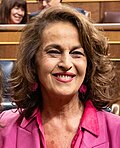 |
|---|
Parliamentary groups in Spain are the institutionalisation or parliamentarisation, of political parties. [1]
Contents
Groups are unified actors with only one voice and together with committees (Spanish : comisiones) and are the main actors in Parliament. In other words the Spanish Parliament is a parliament of groups, not individual MPs who are constrained to act only as part of the group. [2] [3] MPs can only act autonomously when submitting oral or written questions. [4]
All MPs are required to be members of a parliamentary group, [5] usually of the party with whom they were associated when elected [6] but groups can be made up of more than one party (usually when they share an ideology) to increase their profile in Parliament. MPs that cannot satisfy the rules for forming a group join the so-called Mixed Group. Further, parliamentary resources are distributed to groups, not individual MPs.
Each group has at least a President (party leader) and a Spokesperson, or party whip. [7] The spokesperson votes on behalf of the entire group of members in parliamentary debate and the parliamentary committees with their vote weighted in proportion to the size of the group. The whip approves proposed amendments to bills and is the sole member of the group that can speak in debates in parliament. [8] Individual MP’s can proposal bills but they must first be signed by at least 15 MPs which clearly means it will only be accepted if the group supports the bill. [8]
Together, the Spokespersons form the Board of Spokespersons in each house, the council of party representatives in the chamber (Spanish : Junta de Portavoces). The primary function of this Board is to advise the house’s Bureau on the parliamentary agenda. However the Board also to decide on the composition of parliamentary committees. [6]
Parliamentary Groups also appoint members to the Permanent Deputation (Spanish : Diputación Permanente) of each house, the role of which is to assume the powers of the relevant house when dissolved and safeguard the house’s privileges when not in session. [9]
Parliamentary groups also exist in the regional legislatures. The European Parliament has an analogue called political groups. [10] More generally Parliamentary group is also used.



















